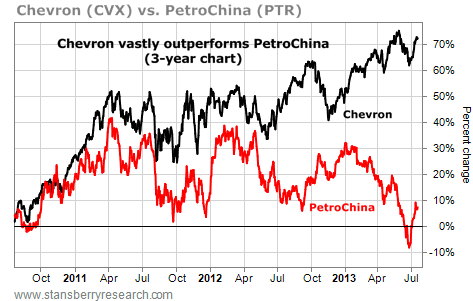| Home | About Us | Resources | Archive | Free Reports | Market Window |
|
Editor's note: On Wednesday, Mark shared his controversial views on discount brokers. In short, he won't use one. His colleagues call him a spendthrift. But for him, it's worth it. It's important, though, to make sure you're working with the right person...
Three Qualities to Look for Before You Go into Business with AnyoneBy
Friday, July 19, 2013
I am not a spendthrift. But I'm not a cheapskate, either.
I know people who are not happy in a deal unless they feel like they've beaten the other guy down to nothing. That approach to business is mean and inefficient. Most times, it will end up backfiring.
Let me tell you why.
You are building a new house. You have asked three contractors for bids. You call in the low bidder and begin the process of chiseling him down on his prices.
He needs the work. (Pretend it is 2010.) So he agrees to build your house for what it costs him. He will be able to keep his workers busy and pay them, but he won't make a nickel of profit on the deal.
You feel great.
But what you don't realize is that in building your house, you will make changes. Dozens of them. And every time you make a change order, he will screw you.
It will be a screwing he believes you deserve. By the time the house is done, he will have his profit and more. And you will have paid a higher price than you should have and made an enemy in the process.
As an investor in residential real estate for 30 years, I've seen this scenario play out at least 100 times.
I've learned from my business and financial relationships that getting the cheapest deal doesn't necessarily mean you're getting the best deal.
Instead, when I go into business with someone, I am looking for three things:
For example, Peter, my main partner in my rental real estate activities, cannot afford to bring cash to the business. But he brings other things. First, Peter is the right match. He's detail-oriented, which I'm not, so he keeps good books. He's also tighter with expenses than I am, so he won't buy a new refrigerator when he can fix the old one for $25.
He's better than I could be with renovations and repairs because he has 30 years of experience working with trades. He knows what services cost. And he's very good with people – happy to listen and compromise but hardly a pushover.
Second, Peter is also someone I work with well – in other words, the right personality. We've been partners in various projects on and off for 40 years. Working with him is fun and easy. That makes the business fun and easy.
Third, the deal we have is a good one. In return for donating some of his expertise and time, I give him a share of the equity. Plus I pay him an arm's-length management fee.
It's a good deal for him because he gets income and equity in the real estate we buy without putting any cash up. It's a good deal for me because Peter takes care of everything. The only thing I really need to contribute for a rental real estate deal is cash.
The relationship works well for me because he does things I can't or won't do on my own. I trust him implicitly. I'm happy to pay him very well for this, and so our deal is fair for both of us.
I have the same philosophy in selecting brokers, financial advisors, and insurance agents. I want expert advice and great service. And I don't want to overpay for it. But I don't want to underpay, either.
Best,
Mark Ford
Further Reading:
Mark recently shared another secret to his success in real estate. "I do not consider market trends when I make investment-buying decisions – with real estate or with anything else... Instead, I use a rule of thumb I learned from my brother Justin, who is a real-estate pro..." Read the essay here: If You're Thinking of Buying Real Estate, Read this First
Market NotesBETTER DEAD THAN RED! Today's chart is a reminder that when it comes to oil and gas investment, it's best to go "for profit," rather than "for the government." Also, it's best to buy American, rather than Chinese.
We've written several commentaries on how silly it is to make long-term investments in "state owned" companies... especially ones headquartered in foreign countries with traditions of fiscal mismanagement. You're better off partnering with a crack addict than the average group of government morons.
In early June, we updated this idea by noting the huge outperformance of shareholder-owned U.S. energy firms versus state-owned Brazilian energy firm Petrobras. But it's not just Brazil that gives investors the short end of the stick. The Chinese will screw you as well...
Below is a three-year performance of U.S. oil and gas firm Chevron (black line) plotted against the performance of China-owned PetroChina (red line). Chevron has raised its dividend for 26 consecutive years. PetroChina is an arm of the Chinese government. As you can see, "for profit" is a heck of a lot better than "for the government."
 |
In The Daily Crux
Recent Articles
|


